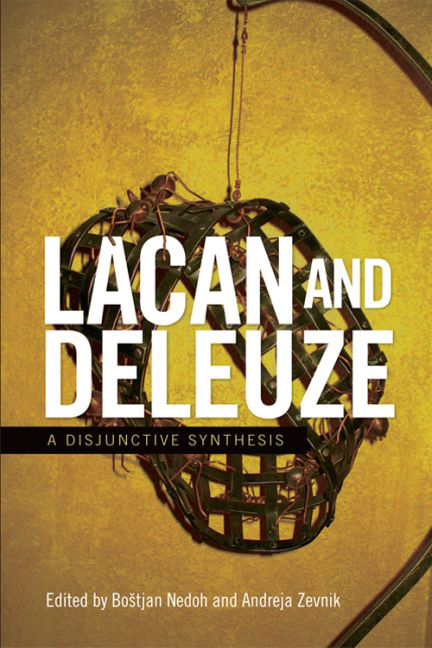Book contents
- Frontmatter
- Contents
- Acknowledgements
- Introduction: On a Disjunctive Synthesis between Lacan and Deleuze
- 1 For Another Lacan-Deleuze Encounter
- 2 Reciprocal Portrait of Jacques Lacan in Gilles Deleuze
- 3 Does the Body without Organs Have Any Sex at All? Lacan and Deleuze on Perversion and Sexual Difference
- 4 Gnomonology: Deleuze's Phobias and the Line of Flight between Speech and the Body
- 5 Lacan, Deleuze and the Politics of the Face
- 6 Denkwunderkeiten: On Deleuze, Schreber and Freud
- 7 Snark, Jabberwock, Poord'jeli: Deleuze and the Lacanian School on the Names-of-the-Father
- 8 Baroque Structuralism: Deleuze, Lacan and the Critique of Linguistics
- 9 Exalted Obscenity and the Lawyer of God: Lacan, Deleuze and the Baroque
- 10 The Death Drive
- 11 Repetition and Difference: Žižek, Deleuze and Lacanian Drives
- 12 Lacan, Deleuze and the Consequences of Formalism
- Notes on Contributors
- Index
8 - Baroque Structuralism: Deleuze, Lacan and the Critique of Linguistics
Published online by Cambridge University Press: 20 April 2017
- Frontmatter
- Contents
- Acknowledgements
- Introduction: On a Disjunctive Synthesis between Lacan and Deleuze
- 1 For Another Lacan-Deleuze Encounter
- 2 Reciprocal Portrait of Jacques Lacan in Gilles Deleuze
- 3 Does the Body without Organs Have Any Sex at All? Lacan and Deleuze on Perversion and Sexual Difference
- 4 Gnomonology: Deleuze's Phobias and the Line of Flight between Speech and the Body
- 5 Lacan, Deleuze and the Politics of the Face
- 6 Denkwunderkeiten: On Deleuze, Schreber and Freud
- 7 Snark, Jabberwock, Poord'jeli: Deleuze and the Lacanian School on the Names-of-the-Father
- 8 Baroque Structuralism: Deleuze, Lacan and the Critique of Linguistics
- 9 Exalted Obscenity and the Lawyer of God: Lacan, Deleuze and the Baroque
- 10 The Death Drive
- 11 Repetition and Difference: Žižek, Deleuze and Lacanian Drives
- 12 Lacan, Deleuze and the Consequences of Formalism
- Notes on Contributors
- Index
Summary
Nowadays it is still common to see Deleuze and Lacan as two rivals standing on entirely opposite shores. The legitimation of this opposition is sought in Deleuze and Guattari's notorious Anti-Oedipus project, whose very name attacks one of the cornerstones of Freudian psychoanalysis, the Oedipal drama of castration and the corresponding notion of negativity. On the other side, Lacan's teaching is said to have pushed structuralism to the extreme, privileging lack and negativity, while also promoting an overall pessimistic vision of politics. However, this perspective could also be inverted. Deleuze and Guattari's project contains a peculiar radicalisation of psychoanalysis, a consequent substitution of the psychological with the schizological: schizo-analysis took a step further in the depsychologisation and deindividualisation of the mental apparatus, or if one prefers, of thinking. Anti-Oedipus pursued the anti-humanist orientation of their ‘arch-rivals’, structuralism and psychoanalysis, whereby it went beyond the boundaries of concepts such as structure and analysis. With Freud, psychoanalysis took the first step by abolishing the metaphysical hypothesis of the soul. The etymology of ‘psychoanalysis’ already contains this point: analysis (decomposition, dissolution, deconstruction) of psyché. Freud's discipline is anti-psychology, which still remains logos of psyche, the science of the soul. With the discovery of the unconscious no soulhypothesis could be sustained any longer, and in this respect Freud indeed produced a ground-breaking epistemological, philosophical and political rupture. From here on the subject could finally be envisaged beyond its anthropomorphic mask: the subject of the unconscious has no human face; it is a decentralised, constitutively alienated and split entity. Yet, Freud did not go beyond the split that the abolition of the soul revealed in the psychic reality. Consequently, psychoanalysis never made the effort to become more than a royal road to negativity, while other attempts to step out of Freud's shadow only amounted to worse. Jung's mysticism brought about the obscurantist regression, while the Anglo-Saxon development continues to represent a conformist regression in accordance with the demands of the free market ideology. Then there is Wilhelm Reich, the bastard psychoanalyst, who in an exaggerated and somewhat delusional way demonstrated that there is something beyond the schism of the mental apparatus discovered by Freud.
- Type
- Chapter
- Information
- Lacan and DeleuzeA Disjunctive Synthesis, pp. 123 - 140Publisher: Edinburgh University PressPrint publication year: 2017



